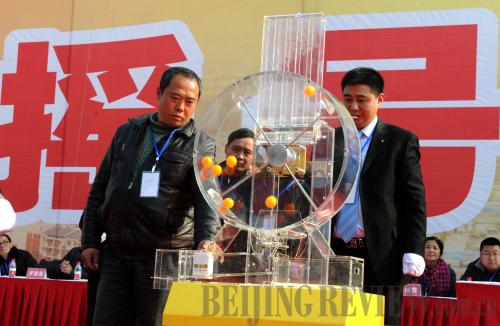|
 |
|
FAIR PLAY: On December 18, Wang Yuquan (left), a resident in Beichuan County, Sichuan Province who survived the catastrophic 8.0-magnitude earthquake in May 2008, uses a lottery machine to decide on the scheme for distributing homes in a rebuilt community to his fellow villagers (YU PING) |
Timely Subsidies
China will raise the pensions for retired enterprise employees and increase living allowances for college students from impoverished families, against increased inflation.
The State Council decided on December 22 to raise the retired enterprise employees' pensions about 10 percent from 2010 levels, or about 140 yuan ($21.2) per person per month on average, beginning January 1, 2011.
There are more than 50 million retired enterprise employees in China. It is the sixth consecutive year China has raised the pensions for retired enterprise employees.
The State Council also decided to increase state allowances for 4.3 million needy college students from the current 2,000 yuan ($303) per student per year to 3,000 yuan ($455).
It also decided to extend tuition waivers to 4.4 million vocational school students, and provide 1,500 yuan ($227) in allowance to each of China's 4.82 million needy high school students on annual basis.
Grim Prospects
China is expected to meet its pollution control targets for the 11th Five-Year Plan period (2006-10), but challenges will be "fairly arduous" in the next development period, Minister of Environmental Protection Zhou Shengxian said on December 21.
Zhou said the sulfur dioxide index is expected to drop 14 percent in 2010 compared with 2005. Also, the index of Chemical Oxygen Demand (COD), a measure of water pollution, is expected to decrease 12 percent.
The 11th Five-Year Plan commits to reducing COD and sulfur dioxide levels by 10 percent during its implementation.
Besides sulfur dioxide and COD, Zhou said, the levels of ammoniacal nitrogen and nitrogen oxides, both major air and water pollutants, kept increasing. He said pollution from motor vehicles and agriculture was becoming more obvious.
Car Curbs
Beijing will limit the issue of new car plates to 240,000 annually in an effort to ease the capital city's traffic jams.
Car buyers will have to obtain car plates by drawing lots before they can drive their cars on road, said the Beijing Municipal Commission of Transport at a press briefing on December 23.
The new policy will take effect on January 1, 2011, the commission said.
In 2010, more than 700,000 new cars were sold in Beijing, bringing the capital city's total number of registered automobiles to more than 4.7 million.
Embezzled Funds
Auditors found in June 142 million yuan ($21.5 million) was wrongly paid to central government agencies as reimbursements for fake invoices, and now 68.31 percent of the funds, or 97.37 million yuan ($14.8 million), have been recovered.
The remaining fake invoices, valued at 45.03 million yuan ($6.8 million), have been transferred to supervisory departments or judicial authorities for further investigation, according to a report submitted on December 22 to the 18th Session of the Standing Committee of the 11th National People's Congress, China's top legislature.
A total of 5,170 was confirmed as fake among the 29,363 "problematic" invoices submitted by 56 central government agencies, says the report.
According to the report, the National Audit Office had recovered 5.34 billion yuan ($809 million) of funds, which were found embezzled in 2009, by the end of October of this year.
A total of 95 officials were arrested, prosecuted, or convicted in the process, and 1,103 received disciplinary punishment. | 